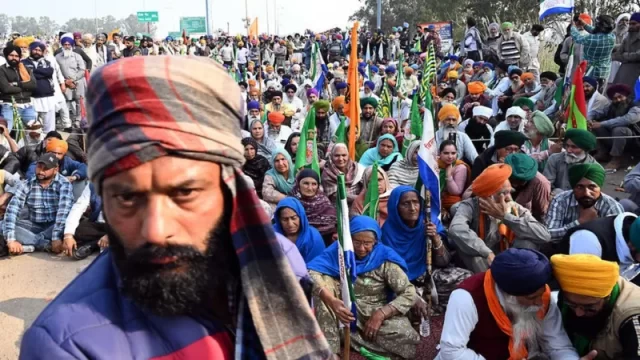Protesting Indian farmers say they will resume marching to capital Delhi this week after rejecting a government proposal to buy some crops at assured prices on a five-year contract.
The protesters began marching last week but were stopped around 200km (125 miles) from Delhi.
Since then, farmer leaders were in talks with the government on their demands.
But on Monday night, they said the offer was “not in their interest”.
The government had proposed buying pulses, maize and cotton at guaranteed floor prices – also known as Minimum Support Price or MSP – through cooperatives for five years.
But the farmers say that they will stand by their demand of a “legal guarantee for MSP on all 23 crops”.
“We appeal to the government to either resolve our issues or remove barricades and allow us to proceed to Delhi to protest peacefully,” Jagjit Singh Dallewal, a farm union leader, told local media.
They say they will resume marching from Wednesday.
Farmers form an influential voting bloc in India and and analysts say the government of Prime Minister Narendra Modi will be keen not to anger or alienate them. His Bharatiya Janata Party (BJP) is seeking a third consecutive term in power in general elections this year.
Last week, authorities clashed with the protesters, firing tear gas and plastic bullets at them in a bid to halt the march. They fear a repeat of 2020, when thousands of farmers camped at Delhi’s borders for months, forcing the government to repeal controversial agricultural reforms.
The latest round of protests began on Wednesday, when farmers from Haryana and Punjab started marching to Delhi. They say the government did not keep promises made during the 2020-21 protest, and also have demands including pensions and a debt waiver.
But their most important demand is a law guaranteeing a support price for crops.
India introduced the MSP system in the 1960s – first for only wheat and later other essential crops – in a bid for food security.
Supporters of MSP say it is necessary to protect farmers against losses due to fluctuation in prices. They argue that the resulting income boost will allow farmers to invest in new technologies, improve productivity and protect cultivators from being fleeced by middlemen.
But critics say the system needs an overhaul as it is not sustainable and will be disastrous for government finances. They also say that it will be ruinous for the agricultural sector in the long run, leading to over-cultivation and storage issues.
Since last week, federal minister Piyush Goyal and other government officials had held four rounds of talks with the farmers. On Sunday, Mr Goyal told journalists that the discussions had been “positive” and that the government was devising an “out-of-the-box” solution to benefit farmers, consumers and the economy.
But on Monday, farmer leaders said they were dissatisfied with the way the talks were being held, claiming that there was no “transparency”.







